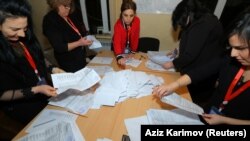President Ilham Aliyev’s Yeni Azerbaijan Party appears to have won Azerbaijan’s February 9 parliamentary elections, according to preliminary official results, although observers from the Organization for Security and Cooperation in Europe reported a lack of “genuine competition” between candidates.
The Yeni (New) Azerbaijan Party received 64 of the legislature’s 125 seats; a tally that will preserve the parliamentary majority it has held for more than 24 years. Only one opposition candidate – the Republican Alternative Party’s Erkin Gadirly – gained a seat, representing a district in the capital, Baku. All other successful candidates are considered aligned with the government.
The results are based on 87 percent of the election protocols from the country’s 125 constituencies. The Central Election Commission put turnout at 47.81 percent of Azerbaijan’s 5.2 million registered voters – a figure the opposition strongly disputes.
International observers from the OSCE also sharply criticized the conduct of the vote, stating on February 10 that irregularities during the vote count and tabulation “raised concerns whether the results were established honestly.”
The findings appear to parallel video reports posted on social media that showed apparent ballot-box stuffing and interference with the work of independent observers, among other irregularities.
The 380 observers found serious faults in the voting procedure at 7 percent of 1,296 visited polling stations; a figure “indicative of serious procedural shortcomings,” the group wrote. The vote count fared no better at more than half of the observed stations; most of the stations displayed “a blatant disregard of important reconciliation procedures and limited transparency.”
Particular attention also was paid to the lack of “any serious coverage of the campaign in traditional media” and the lack of TV debates as well as equal access to television airtime.
“Most candidates did not present alternative programmes or views to those of the ruling party, and the campaign, overall, was devoid of the political engagement essential for a competitive race and a genuine choice for voters,” the observers’ preliminary statement read.
Past OSCE observation missions have reached similar conclusions about Azerbaijani elections.
The websites of government-aligned news outlets generally avoided mentioning the OSCE findings, instead focusing on other observers who only had praise for the vote’s conduct.
Nonetheless, the CEC does not deny that some problems occurred. It has pledged that it will not tolerate verified cases of election violations.
On February 10, Deputy CEC Chairman Rovzat Gasymov stated that the Commission will take “appropriate and radical measures” about any verified violations mentioned in the roughly 280 calls the Commission’s hot line received. He earlier had stated that they were all “of a technical nature.”
The Central Election Commission received a generally positive assessment from the OSCE for its “concerted efforts to act transparently” and “welcoming” attitude toward observers.
Nonetheless, opposition members’ distrust of the election process has not changed.
The preliminary results only show that the National Council of Democratic Forces, an opposition coalition, “was right in its decision to boycott” the vote, wrote Azerbaijani Popular Front Party Chairman Ali Kerimli on Facebook.






Facebook Forum